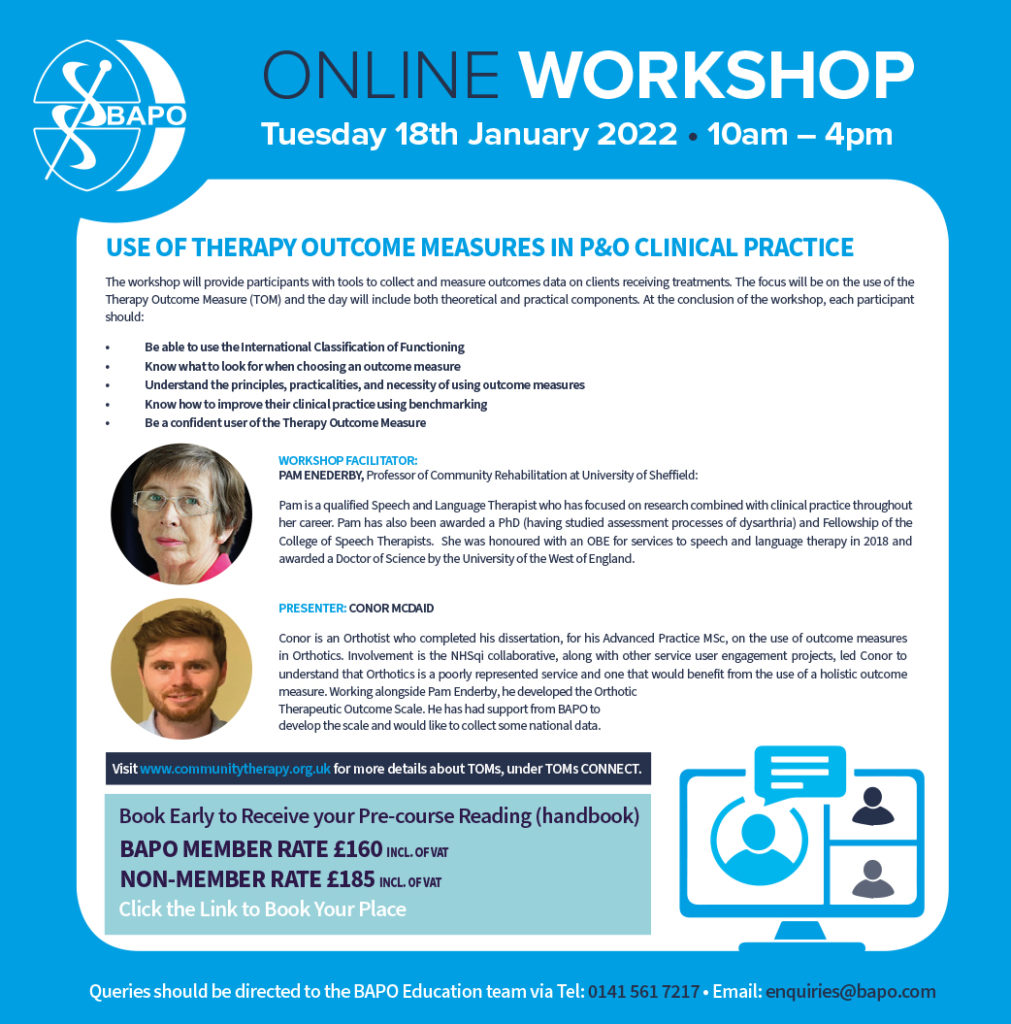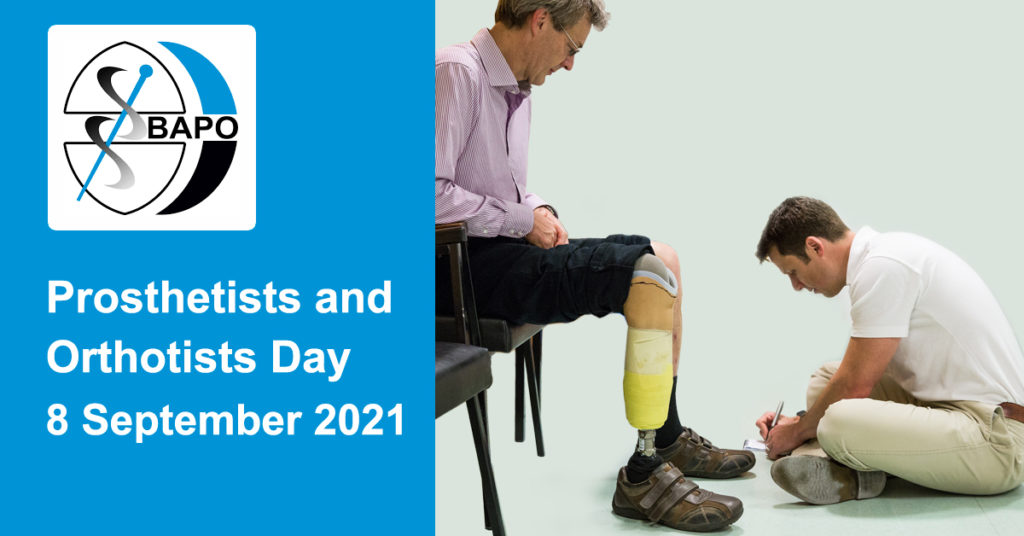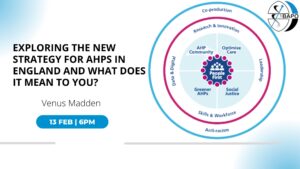Education
BAPO Events Survey
BAPO is asking members and non-members alike to complete a quick survey on events that BAPO may run in the coming years. The survey will only take a few minutes but will help shape the events we run
BAPO’s Mentoring Programme
The British Association of Prosthetists and Orthotists (BAPO) is delighted to launch its mentoring scheme which is an exclusive, fully funded service offered to our members.
Members can use this service at any career stage to gain personalised guidance on a range of topics. Like all allied health profession (AHP) roles, prosthetists and orthotists, and our support workforce, face challenges. We believe anyone from the very start of their career to experienced staff can benefit from the support and guidance a suitable mentor can provide.
The BAPO team believes mentoring provides:
- Valuable experiences to the mentees, who are able to call on the experience and knowledge of other members of the prosthetic and orthotic (P&O) profession, and colleagues external to P&O, to help their career development.
- Valuable leadership and management skills to mentors, from accessing our mentor training resources, to gaining experience in helping others progress in their career.
Mentoring relationships facilitate personal and professional development through support, challenge and review. Mentoring is about encouraging mentees to take responsibility for their own progression and challenging them to find their own answers.
If this is something you’re interested in learning more about, follow these steps to sign up:
- Register by clicking on this link or the button below. Once registered you can access our introductory videos and guidance to help you get the most out of the mentoring relationship.
- Decide the areas you would like to work on in a mentoring relationship – the support you are looking for as a mentee, or the areas where you would be willing to support others as a mentor.
- Then when you are ready, click the link and create your mentee or mentor profile. You can go back and edit it anytime you like and there are tools in the system to help mentees refine their goals.
What happens next?
- The dedicated profile matching system will help mentees identify potential matches, based on their profile and what they would like to work on.
- If you have found someone who looks like a good match, introduce yourself and have an initial conversation You’ll both be able to decide whether you want to work together before you commit. Don’t worry if you don’t find a match right away – there are new mentors and mentees signing up all the time.
- Once you have a match and have agreed to work together, the platform will help you keep moving forward with prompts and advice.
- At the end of your mentoring relationship, it will help you look at what you’ve achieved together – and decide what you would like to do next.
We’d love to hear from you once you’ve signed up as we’re keen to understand how the prosthetics and orthotics profession will benefit from this BAPO-member exclusive opportunity.
For more information contact: Enquiries@bapo.com
Updated Physical Health and Activity elearning programme
Health Education England elearning for healthcare (HEE elfh) has worked with the Office for Health Improvement & Disparities to refresh the content in the Physical Health and Activity programme.
Physical activity is one of can be one of the most important tools in the healthcare professional’s toolkit for condition management. It can lead to improved clinical outcomes in over 30 different chronic diseases, including type 2 diabetes, cardiovascular disease, heart disease, stroke, diabetes and several cancers type 2 diabetes, and be as effective as medication in many instances: hypertension, stroke, and mild-to-moderate depression, to name just a few.
This updated elearning course prepares GPs, nurses and other healthcare professionals to champion the benefits of physical activity with their patients and help prevent and manage a number of health conditions.
The eleven elearning modules identify the benefits of physical activity and explore the ways in which it can be applied to prevent and manage a number of health conditions. The course familiarises the learner with how physical activity can benefit a number of different population groups including, children, pregnant women and older people as well as considering musculoskeletal health, the CMO guidelines and how to use motivational techniques to encourage behaviour change in patients.
An Introduction to Physical Health and Activity is also available in the elearning programme.
BAPOs Leadership Programme 2022-2023
Why?
Prosthetists and orthotists will be most effective in delivering and improving healthcare if there is sufficient leadership to maximise their contribution and impact their future.
This programme is aimed at harnessing the potential of prosthetists and orthotists to transform
healthcare. Like other AHP professions, outcomes in prosthetics and orthotics (P&O) are often
poorly understood, resulting in missed opportunities to support improvement.
The British Association of Prosthetists and Orthotists’ (BAPO) aim is to develop a programme which
fulfils the delegates’ leadership expectations from both an operational and strategic perspective, to
provide a catalyst for their future professional and career development.
What?
Course content
• Delivery by national and international speakers
• AHP leadership – where you fit in
• Leadership theories
• Adaptability and resilience
• Working with colleagues – understanding personality traits
• SpotlightPROFILE – individual assessment profiles to support understanding of self
• Business case writing in healthcare – an essential tool for improving your services
• Making an impact – leadership that works
When?
The Leadership Programme will commence on Friday 25th November 2022, with a follow
up session in early 2023. In addition, we will be hosting evening seminars to support the learners
on their leadership journey.
Where?
The event will take place face to face at the Royal College of Podiatry offices, Tower
Bridge, London, a world class venue. The follow up session and the evening seminars will be held
virtually.
Who?
This fully funded programme is open to all BAPO members across the UK. The programme
has been developed to support the next generation of leaders in P&O.
Application process
To apply for one of the limited spaces, applicants need to complete a 250-word
expression of interest to attend this programme, entitled:
“How this BAPO leadership programme will assist my own professional development”
Send your expression of interest by completing the MS Form and emailing your CV to
enquiries@bapo.com.
Closing date – Monday 5th September 2022
Successful candidates will be informed by Friday 16th September 2022
Background Information
BAPO has been successful in obtaining an educational grant from Health Educational England
(HEE). This funding will support a professional development programme to support the next
generation of leaders in P&O.
To be truly effective, leaders need to build a toolkit of knowledge, skills and behaviours that will set
them, their teams, and their organisations up for success.
Leaders are role models, and the example they set has a huge impact on the organisational
culture. It is therefore critical that they first appreciate and then demonstrate the appropriate
behaviours that build trust and promote a positive working environment – and do so authentically
and consistently.
The programme has been developed and will be facilitated by Real Healthcare Solutions Ltd.
MSK Course
BAPO have just released additional dates for the MSK course. To book please go to the members section and either sign into your account if you are a member or for non-members create a temporary account to book electronically
This course is now full

KAFO – In the Perfect World
BAPO are proud to announce 2 new dates for the popular KAFO ‘In the Perfect World Course’. We expect this course to fill up quite fast and there are limited places so please book now to avoid disappointment
This course is for technicians and clinicians alike. It aims to address the problems associated with information exchange between professional groups within the industry, and how they can be compounded through a lack of experience, confidence, and understanding, between both cohorts. Our aim is to highlight simple steps in the patient journey and technical process that will save time, money, and variability in practice and improve outcome in both clinical and manufacturing terms. We will try to make up for the fact we don’t live in a perfect world, so will present many tips and tricks to simplify our collective practice
TO BOOK: log onto the members area, or if not a members – complete the non members section

MSK Foot and Ankle
BAPO are proud to continue to facilitate the amazing MSK Foot and Ankle – Holistic Management and Treatment Strategies Course. Led by Simon Dickinson, Laura Barr and Chris Cox.
If you haven’t attended yet this is a course not to miss!
TO BOOK: log onto the members area, or if not a members – complete the non members section
TOMS Course
Do you want to learn more about this innovative outcome measure? Don’t miss out and book your place on our online workshop today!

Prosthetists and Orthotists Day – only days away!
With the first ever Prosthetists and Orthotists (P&O) Day only days away the British Association of Prosthetists and Orthotists (BAPO) is reminding prosthetists and orthotists to support the awareness day in their own services and organisations.
Taking place on the 8th September 2021, the awareness day aims to raise the profile of the two disciplines primarily with other health and care professionals. The day will provide the opportunity for prosthetists and orthotists to celebrate the profession and the benefit these roles have for patients accessing the services.
A suite of case studies is being prepared, based on information shared from prosthetists and orthotists across the country, to demonstrate the role the profession play in promoting patient wellbeing, health and rehabilitation.
There is also a P&O Day toolkit which includes various assets – social media content, website banners, posters etc – for BAPO members to use throughout their organisations and networks to raise the profile of the awareness day. The toolkit can be accessed here.
If you have got a case study or success story to share about the P&O profession, please complete the template which can be found on the P&O Day page on the BAPO website and return it by 31 August 2021

